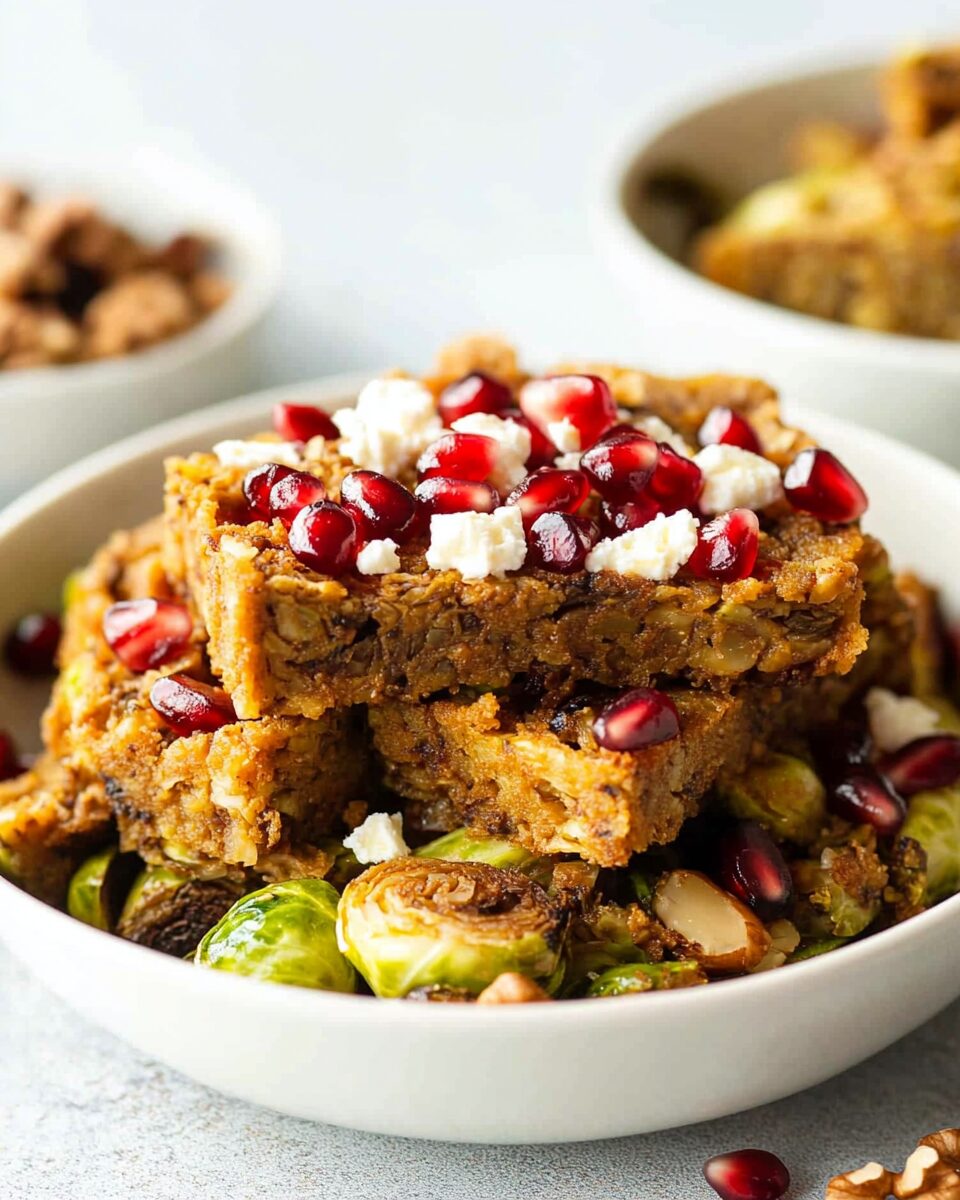This fresh and vibrant salad combines the crispness of shaved Brussels sprouts with the burst of sweetness from juicy pomegranates. Perfect for a healthy and refreshing side dish, it’s easy to prepare and full of flavor.
FULL RECIPE
Ingredients
- 1 pound Brussels sprouts, shaved
- 1/2 cup pomegranate seeds
- 1/4 cup chopped walnuts, toasted
- 1/4 cup crumbled feta cheese
- 2 tablespoons extra virgin olive oil
- 1 tablespoon lemon juice
- 1 teaspoon honey
- Salt and pepper, to taste
Directions
- Shave the Brussels sprouts thinly using a sharp knife or mandolin.
- In a large bowl, combine the shaved Brussels sprouts, pomegranate seeds, toasted walnuts, and crumbled feta cheese.
- In a small bowl, whisk together the olive oil, lemon juice, honey, salt, and pepper.
- Pour the dressing over the salad and toss to combine thoroughly.
- Adjust seasoning to taste and serve immediately.
Nutritional Information
- Calories: 180 per serving
- Protein: 4g
- Carbohydrates: 12g
- Fat: 14g
- Fiber: 3g
- Sugars: 5g
The Benefits of Brussels Sprouts in Your Diet
Brussels sprouts are often overlooked in many meals, but they are a powerhouse of nutrition. These mini-cabbage-like vegetables are rich in vitamins, minerals, and antioxidants that provide numerous health benefits. They are an excellent source of vitamin C, K, and folate. Vitamin C helps to boost the immune system, while vitamin K plays a crucial role in bone health and blood clotting. Additionally, Brussels sprouts are a great source of fiber, which supports digestive health and can aid in maintaining a healthy weight.
Why Pomegranates Are a Perfect Match for Salads
Pomegranates bring a refreshing burst of sweetness and tang to any salad, making them the perfect complement to the earthiness of Brussels sprouts. The bright red seeds add both color and flavor, which can elevate a simple dish to something special. Pomegranates are loaded with antioxidants, particularly punicalagins and anthocyanins, which have anti-inflammatory effects and are thought to help protect against certain chronic diseases. They also offer a good amount of fiber and vitamin C, contributing to skin health and immune function.
How to Choose the Best Brussels Sprouts
Selecting the freshest Brussels sprouts is key to making your salad taste the best. Look for sprouts that are tightly packed and firm to the touch. Avoid those that are yellowing, wilting, or have brown spots. Small to medium-sized Brussels sprouts tend to be the most tender and flavorful. If possible, buy them on the stem, as they stay fresher longer. Always wash them thoroughly before preparing, as dirt and debris can easily hide in their layers.
Toasting Walnuts for Added Flavor
Toasting walnuts enhances their flavor by bringing out a deeper, nuttier taste. When toasted, walnuts become crispy and aromatic, which adds texture and richness to the salad. Toasting is easy: simply place the walnuts in a dry pan over medium heat, stirring occasionally, until they are golden and fragrant. Be sure not to overcook them, as walnuts can burn quickly. The toasted walnuts add a pleasant crunch that contrasts nicely with the softness of the Brussels sprouts.
Feta Cheese: A Creamy Addition
Crumbled feta cheese offers a tangy and creamy element that balances the bitterness of the Brussels sprouts and the sweetness of the pomegranates. Feta is also a source of calcium, which is important for maintaining strong bones and teeth. Its rich flavor enhances the salad, while the crumbly texture ensures each bite is satisfying. Opt for high-quality feta cheese for the best taste, preferably one made from sheep’s milk for a creamier, more authentic texture.
The Role of Olive Oil in Salad Dressings
Olive oil is the base for many salad dressings, including this one. Known for its heart-healthy monounsaturated fats, olive oil provides a smooth texture and a mild, slightly fruity flavor that ties the ingredients together. It’s also a rich source of antioxidants, particularly polyphenols, which help reduce inflammation and promote overall health. Use extra virgin olive oil for the best flavor and the most nutritional benefits. When mixed with lemon juice and honey, it forms a delicious, well-rounded dressing that coats the salad perfectly.
Adding Sweetness with Honey
A small amount of honey adds just the right amount of sweetness to balance the savory flavors in the salad. Honey is a natural sweetener that also provides small amounts of vitamins and minerals, including vitamin C and antioxidants. Its thick, syrupy consistency helps to emulsify the dressing, making it stick better to the ingredients. Honey pairs wonderfully with the acidity of lemon juice, giving the dressing a harmonious sweetness and tartness that complements the Brussels sprouts and pomegranates.
The Importance of Lemon Juice in Dressings
Lemon juice adds a bright, citrusy acidity to the salad dressing that enhances the flavors of the vegetables and fruit. It helps to cut through the richness of the olive oil, balancing the dressing’s flavor. In addition to its zesty taste, lemon juice is rich in vitamin C, an essential nutrient that supports the immune system and promotes skin health. Freshly squeezed lemon juice is always preferable to bottled lemon juice for the best taste.
How to Make the Salad Ahead of Time
While this salad is best served fresh, it can be prepared ahead of time with a few simple adjustments. To make it ahead, store the shaved Brussels sprouts, pomegranate seeds, walnuts, and feta separately. Keep the dressing in a separate container, and only toss the salad together right before serving. This prevents the Brussels sprouts from wilting and ensures that the salad stays crisp and fresh. The dressing can also be made in advance and stored in the refrigerator for up to a week.
The Best Ways to Serve the Salad
This salad can be served as a side dish or as a light main course. It pairs well with grilled chicken, roasted salmon, or even as a standalone vegetarian meal. The bright colors and fresh ingredients make it an ideal addition to holiday gatherings, summer barbecues, or any special occasion. If you’re serving it as a main dish, you can add extra protein, such as chickpeas, quinoa, or grilled tofu, to make it more filling.
Adjusting the Salad to Your Taste
Feel free to customize this salad to suit your personal preferences. If you’re not a fan of feta, you can substitute it with goat cheese or blue cheese for a different flavor profile. For a vegan version, simply omit the cheese and consider adding avocado for creaminess. If you prefer a spicier salad, toss in some sliced jalapeños or a pinch of red pepper flakes to give it a kick. The beauty of this salad is in its versatility, allowing you to adapt it to suit various dietary needs and flavor preferences.
Why This Salad is Great for Special Diets
This salad is naturally gluten-free and can be easily adapted to fit into a variety of dietary plans. It’s a great option for those following a low-carb or ketogenic diet because it’s packed with fiber and healthy fats while being low in carbohydrates. For those following a vegetarian or vegan diet, the salad can be customized by omitting the cheese and adding plant-based protein sources like beans or tofu.
Nutritional Value of Each Ingredient
Brussels sprouts are low in calories but high in fiber, vitamins, and minerals. Pomegranates add antioxidants, fiber, and vitamin C, while walnuts contribute healthy fats and protein. Feta cheese provides calcium and protein, and olive oil offers healthy fats that support heart health. Lemon juice adds vitamin C, while honey provides natural sweetness and small amounts of vitamins. Together, these ingredients create a nutritious and balanced dish that supports a healthy lifestyle.
Why You Should Include More Salads in Your Diet
Salads like this one are an excellent way to incorporate a wide variety of nutrients into your diet. With an abundance of vegetables, fruits, nuts, and healthy fats, salads offer a wealth of vitamins, minerals, fiber, and antioxidants. Eating more salads can support your digestive health, improve your skin, boost your immune system, and provide a low-calorie, nutrient-dense option for meals or snacks. By using fresh, seasonal ingredients, you can create salads that are not only delicious but also packed with nutrients.
The Role of Antioxidants in a Healthy Diet
Antioxidants are compounds that help protect the body from damage caused by free radicals. Free radicals can lead to inflammation and contribute to the development of chronic diseases, including heart disease and cancer. Pomegranates, Brussels sprouts, walnuts, and olive oil are all rich in antioxidants, making this salad an excellent choice for those looking to increase their antioxidant intake. Consuming a variety of antioxidant-rich foods can help reduce oxidative stress and promote overall health.
Perfect Pairings for a Balanced Meal
To turn this salad into a complete, well-rounded meal, consider pairing it with lean protein and whole grains. Grilled chicken, fish, or even a serving of quinoa would complement the fresh flavors and provide the necessary protein and carbs to fuel your body. You can also serve it with a slice of whole-grain bread for added fiber. Combining this salad with protein and grains ensures that your meal is balanced, filling, and nourishing.
How to Store Leftovers
If you have any leftovers, store them in an airtight container in the refrigerator. The salad will keep for a day or two, though it is best enjoyed fresh. If the dressing has already been added, the Brussels sprouts may start to wilt, so it’s better to store the dressing separately and toss it in just before serving. You can also store the pomegranate seeds and walnuts separately to keep them fresh.
Customizing the Dressing for Extra Flavor
While the simple lemon-honey dressing is delightful, you can experiment with different flavors to customize it to your liking. Adding a teaspoon of Dijon mustard gives the dressing a sharp, tangy twist, while a splash of balsamic vinegar adds depth and richness. For a creamy version, blend in a bit of Greek yogurt or tahini. Feel free to experiment with herbs, such as thyme, parsley, or mint, for a fragrant twist that elevates the overall taste of the salad.
The Importance of Seasonal Ingredients
Using seasonal ingredients in your salad not only ensures freshness but also helps you get the best flavors from the produce available at different times of the year. Brussels sprouts are typically in season during the colder months, making this salad perfect for fall and winter. Pomegranates are typically available in the fall, adding a seasonal touch. By incorporating seasonal ingredients, you’re also supporting local farmers and getting the freshest produce possible.
Why This Salad is a Great Option for Meal Prep
This Brussels sprout salad is an ideal choice for meal prep. The ingredients are simple to prepare, and the salad holds up well in the fridge. Since the Brussels sprouts are raw, they can last for several days in the refrigerator, and the dressing can be made in advance. Meal prepping this salad means you’ll have a healthy, vibrant side dish or light meal ready to go throughout the week. Simply portion out the salad, add the dressing when you’re ready to eat, and you’re all set for a quick, nutritious meal.
Conclusion
This Fresh Shaved Brussels Sprouts Salad with Juicy Pomegranates is a perfect combination of health and flavor. With its bright colors, crunch, and balance of sweet and savory flavors, it’s sure to be a crowd-pleaser at any gathering or as a daily meal option. The salad is easy to make, adaptable to different diets, and packed with nutrients that support overall well-being. Whether served as a side dish or main course, it’s a great way to enjoy fresh, seasonal ingredients in a deliciously satisfying way.






